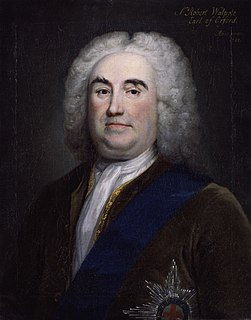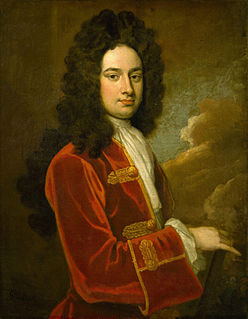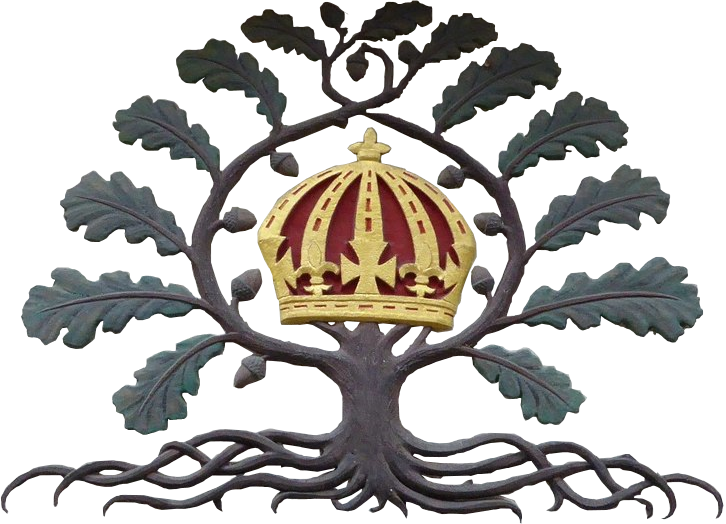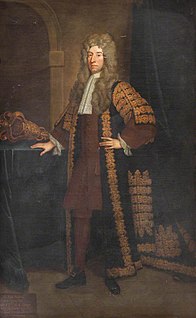
George I was King of Great Britain and Ireland from 1 August 1714 and ruler of the Duchy and Electorate of Brunswick-Lüneburg (Hanover) in the Holy Roman Empire from 23 January 1698 until his death in 1727. He was the first British monarch of the House of Hanover.

Robert Walpole, 1st Earl of Orford,, known between 1721 and 1742 as Sir Robert Walpole, was a British politician who is generally regarded as the de facto first Prime Minister of Great Britain.

William Pulteney, 1st Earl of Bath was an English Whig politician who sat in the House of Commons from 1707 to 1742 when he was created the first Earl of Bath by King George II. He is sometimes stated to have been Prime Minister, for the shortest term ever in 1746, although most modern sources reckon that he cannot be considered to have held the office.

James Stanhope, 1st Earl Stanhope was a British soldier, diplomat and statesman who effectively served as Chief Minister between 1717 and 1721.

Charles Spencer, 3rd Earl of Sunderland, KG, PC, known as Lord Spencer from 1688 to 1702, was an English statesman and nobleman from the Spencer family. He served as Lord Lieutenant of Ireland (1714–1717), Lord Privy Seal (1715–1716), Lord President of the Council (1717–1719) and First Lord of the Treasury (1718–1721).

Charles Townshend, 2nd Viscount Townshend, was an English Whig statesman. He served for a decade as Secretary of State for the Northern Department, 1714–1717, 1721–1730. He directed British foreign policy in close collaboration with his brother-in-law, prime minister Robert Walpole. He was often known as Turnip Townshend because of his strong interest in farming turnips and his role in the British Agricultural Revolution.

Spencer Compton, 1st Earl of Wilmington, was a British Whig statesman who served continuously in government from 1715 until his death. He sat in the English and British House of Commons between 1698 and 1728, and was then raised to the peerage and sat in the House of Lords. He served as the Prime Minister from 1742 until his death in 1743. He is considered to have been Britain's second Prime Minister, after Sir Robert Walpole, but worked closely with the Secretary of State, Lord Carteret, in order to secure the support of the various factions making up the Government.

The Tories were a political faction and then a political party in the parliaments of England, Scotland, Great Britain, Ireland and the United Kingdom. Between the 1670s and 1830s, the Tories contested power with their rivals, the Whigs.

Admiral of the Fleet Edward Russell, 1st Earl of Orford, PC was a Royal Navy officer and politician. After serving as a junior officer at the Battle of Solebay during the Third Anglo-Dutch War, he served as a captain in the Mediterranean in operations against the Barbary pirates.
Robert Walpole and Charles Townshend, 2nd Viscount Townshend were removed from their positions in the government, and were replaced by James Stanhope, 1st Viscount Stanhope of Mahon and Charles Spencer, 3rd Earl of Sunderland, who cooperatively led the first Stanhope–Sunderland ministry. The two Whigs remained in power from 1717 to 1721, although in 1718, Lord Stanhope exchanged positions with Lord Sunderland to form the second Stanhope–Sunderland ministry. Upon Lord Stanhope's death, Robert Walpole, widely considered the first true Prime Minister of Great Britain, returned to head the government.

Henry Boyle, 1st Baron Carleton, was an Anglo-Irish Whig politician who sat in the Irish House of Commons from 1692 to 1695 and in the English and British House of Commons between 1689 and 1710. He served as Chancellor of the Exchequer and Secretary of State, and after he was raised to the peerage as Baron Carleton, served as Lord President of the Council.

Richard Onslow, 1st Baron Onslow PC, known as Sir Richard Onslow, 2nd Baronet from 1688 until 1716, was a British Whig politician who sat in the English and British House of Commons from 1679 to 1715. He was Speaker of the House of Commons from 1708 to 1710 and Chancellor of the Exchequer from 1714 to 1715. Onslow was a very unpopular figure amongst members of both political parties, particularly during his time as Speaker. He was extremely pedantic and showed an absolute devotion to principle, as a result he was given the nickname "Stiff Dick".

Admiral of the Fleet Matthew Aylmer, 1st Baron Aylmer, of Covent Garden, Westminster, and Westcliffe, near Dover, was an Anglo-Irish Royal Navy officer and Whig politician who sat in the English and British House of Commons between 1695 and 1720.
The Whig Junto is the name given to a group of leading Whigs who were seen to direct the management of the Whig Party and often the government, during the reigns of William III and Anne. It was the inspiration for Benjamin Franklin's Junto in 1727 Philadelphia upon his return from London. The Whig Junto proper consisted of John Somers, later Baron Somers; Charles Montagu, later Earl of Halifax; Thomas Wharton, later Marquess of Wharton, and Edward Russell, later Earl of Orford. They came to prominence due to the favour of Robert Spencer, 2nd Earl of Sunderland and during the reign of Queen Anne, Sunderland's son, the 3rd Earl succeeded his father. Opponents gave them the nickname "the five tyrannising lords". Other figures prominent around the edges of the Junto include Sir John Trenchard and Thomas Tollemache.

Alan Brodrick, 1st Viscount Midleton, PC (Ire) was a leading Irish lawyer and politician who sat in the Parliament of Ireland between 1692 and 1715 and in the British House of Commons from 1717 to 1728. He was Speaker of the Irish House of Commons and Lord Chancellor of Ireland. Although he was a man of great gifts, he was so hot-tempered that even Jonathan Swift is said to have been afraid of him.

Daniel Pulteney was an English government official and politician who sat in the House of Commons from 1721 to 1731.
John Pulteney, of St James's, Westminster and Harefield, Middlesex, was an English lawyer and Whig politician who sat in the English and British House of Commons from 1695 to 1710.

The 5th Parliament of Great Britain was summoned by George I of Great Britain on 17 January 1715 and assembled on the 17 March 1715. When it was dissolved on 10 March 1722 it had been the first Parliament to be held under the Septennial Act of 1716.

The Whig Split occurred between 1717 and 1720 when the British Whig Party divided into two factions, one in government led by James Stanhope while the other in opposition was dominated by Robert Walpole. It coincided with a dispute between George I and his son George, Prince of Wales, with the latter siding with the opposition Whigs. It is also sometimes known as the Whig Schism.
















